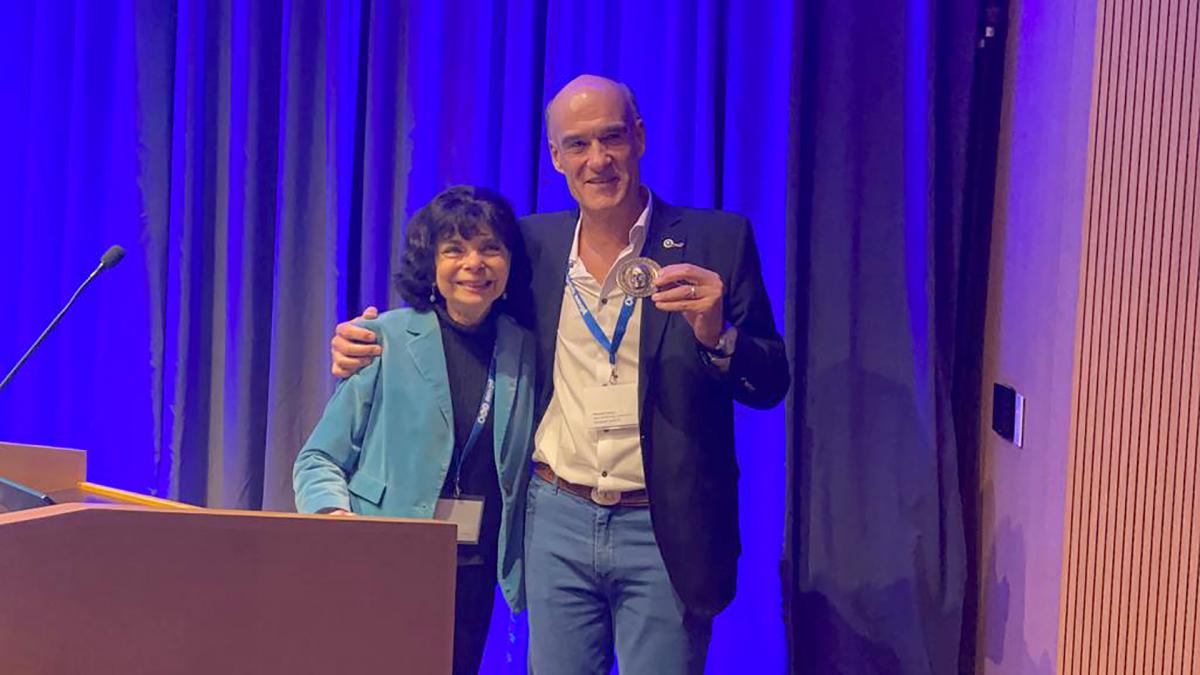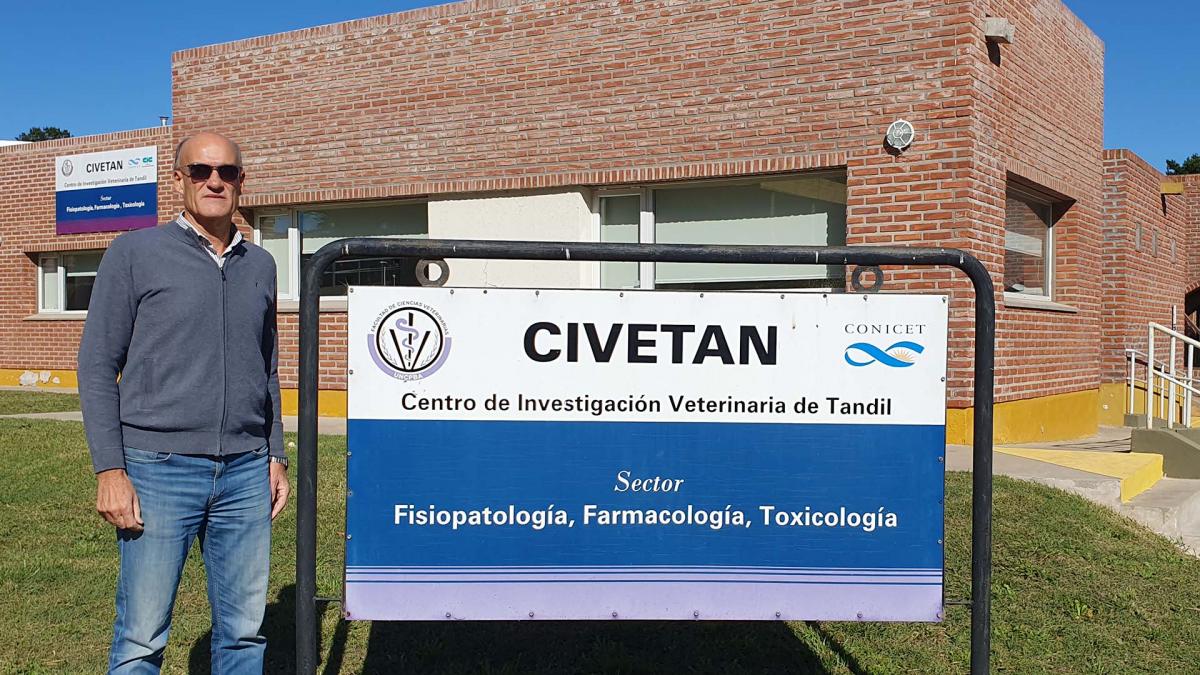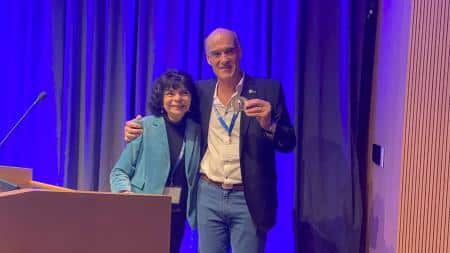 The scientist has extensive training in our country and the world / Photo: Press
The scientist has extensive training in our country and the world / Photo: Press
Professor Carlos Lanusse, CONICET researcher and member of an institute of the National University of the Center of the province of Buenos Aires (UNICEN), is the first Latin American scientist to receive the “Lloys David Memorial Award” granted by the American Academy of Pharmacology and Veterinary Toxicology (AAVPT), considered the highest world distinction in this discipline, was officially reported today.
Since the Royal Swedish Academy of Sciences, which awards the Nobel Prize, does not include the Veterinary discipline among its award categories, in scientific fields it is considered that the distinction awarded by the AAVPT is the highest merit to which a researcher of this biomedical discipline, highlighted a statement from Conicet-Tandil.
Lanusse and the Veterinary Research Center of the University of Tandil (CIVETAN) -which he founded and has been a member of for decades- had a leading role in the investigations endorsed by the Ministry of Science and Technology, which were carried out to seek treatments against Covid-19 based on the application of ivermectin, a drug widespread in veterinary use that achieved successful results in the fight against this disease that was declared a pandemic in 2020.
But the award for Lanusse -who currently works as Professor of Veterinary Pharmacology, CONICET Senior Researcher, and member of the Tandil Veterinary Research Center (CIVETAN)- is based on his career as a man of science.
The Academy recognized Lanusse for “merit to the remarkable academic career, to the contribution to the training of human resources and for his contribution to scientific knowledge throughout his career”which makes him the first Latin American scientist to obtain this award.
The delivery ceremony was held in Washington and included the presentation of a plenary conference where he spoke about his extensive academic and scientific journey.
 The Award called “Lloyd Davis Memorial Award” is a prestigious international recognition / Photo: Press
The Award called “Lloyd Davis Memorial Award” is a prestigious international recognition / Photo: Press
“This distinction places us at the forefront of world science, which, having done all this work from Argentina and in Tandil in particular, gives it even greater relevance,” Lanusse told the Télam agency and explained that despite receiving several national and international distinctions “without a doubt, this is the most important”.
He stressed that in this award, “what is relevant is that it is for a whole career, for all the scientific contribution and knowledge in veterinary pharmacology” and pointed out that it is a recognition of the “global, scientific knowledge” contributed and “the training of human resources that have helped the development of the discipline on a global scale”.
In addition, the professor from Tandil considered that “it highlights the importance of scientific research in the area of animal health and production that is carried out in Argentina and that reaches an international status of high impact.”
Premio “Lloyd Davis Memorial Award”
The Award called “Lloyd Davis Memorial Award” is a prestigious international recognition that was delivered after a meticulous evaluation process by a disciplinary committee made up of experts from around the world.
In this context, Lanusse indicated that it is a recognition “very important for national science” and added: “Any prize that an Argentine scientist obtains at an international level is transcendental because it positions and places science on a high level within the scientific world.”
“Being from an American Academy, it is eloquent evidence of the importance investment in science and technology has for a country,” he continued, stressing the importance of “being at the forefront and that these scientific developments can be transformed into advances to change the lives of Argentines”.
(S) A scientist trained in public education” Born in 1959 in Orense, Buenos Aires province, Lanusse graduated as a veterinarian at UNICEN in 1983 with a Gold Medal.
Lanusse did a postgraduate degree at the University of La Plata (UNLP) and then continued his research career in Canada (Mc Ghill University).
The scientist was in charge of numerous human resources of all categories, was responsible for national/international research and technological development projects and author of 326 publications and book chapters on the pharmacological bases of the antiparasitic activity and evaluation of the development of resistance to different drugs, with an impact on animal and human health.
The international impact of scientific production is reflected in the 6,367 citations (h-index = 44 Scopus) and 8,972 citations (h-index: 52, Google Scholar). He was in the first position for Argentina in 2022 and 2023 in the Ranking of Best Scientists in Animal Science and Veterinary, according to the Research.com platform.
Asked about the current status of his work, the expert pointed out that he develops his research “under the paradigm of one health”: “a transversal approach to science from animal health, human, environmental and public health”.
“Within this framework, we work on the optimization of treatments”explained and graphed that “for example, we are now working on the control of parasites both in animals and in humans, always looking for a treatment optimization strategy and fighting against these mechanisms that parasites have, to evade the response to drugs.
The idea, he said, is to “reduce this capacity of parasites” with the purpose of “transferring our contributions from animal health to the health of human beings.”
Other awards that the veterinarian received are: AAVP Graduate Research Award (USA, 2011); Bernardo Houssay Award (SECYT, 2003); Bayer Prize in Veterinary Sciences 2005; Argentine Society of Veterinary Medicine Award (2011); Bunge & Born Foundation Award (2011); Distinction for Scientific Trajectory (Senate Pcia. Bs As, 2011); Konex Platinum Award (2013); Chemical Pharmaceutical Industry Studies Center Award (2013); Excellence Research Award, World Association Advancement of Veterinary Parasitology (UK, 2015); Distinguished Research Award in Veterinary Parasitology from the American Veterinary Association. Parasitology (USA, 2019), among others.


